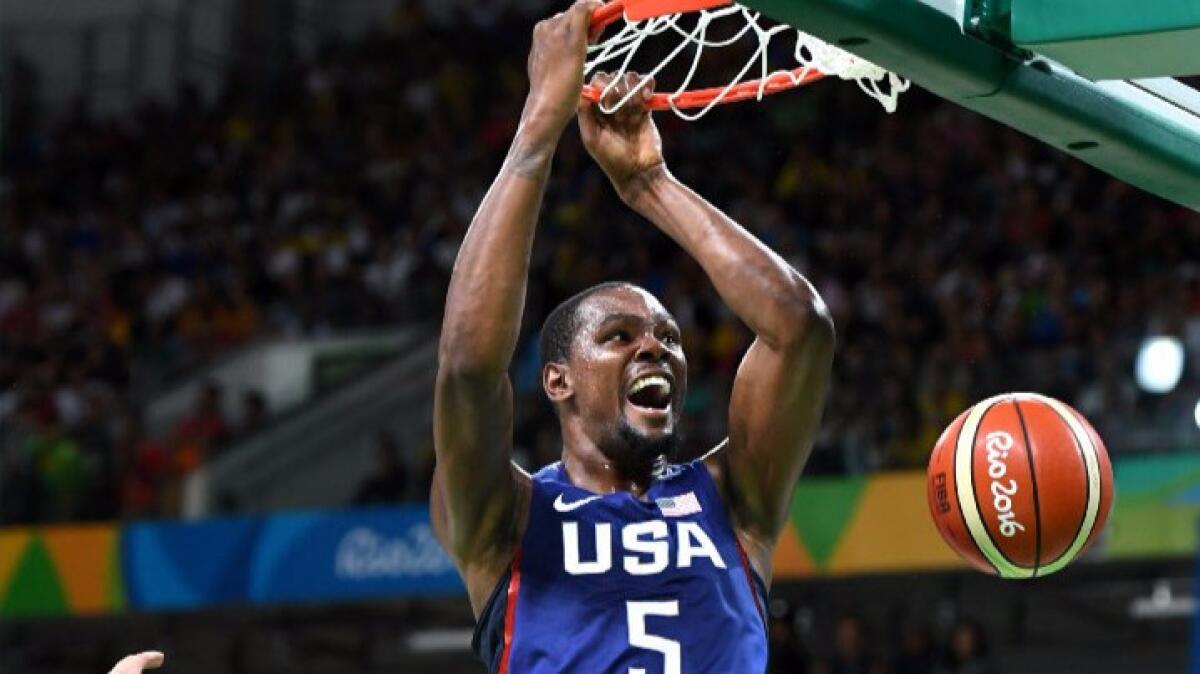Column: Durant gets into the Olympic spirit with a spirited gold medal performance

- Share via
Reporting from Rio de Janeiro — He was branded a traitor, an opportunist, a coward. He was ridiculed in his neighborhood, resented in his workplace, mocked by his former fans.
When Kevin Durant left the Oklahoma City Thunder to join the powerful Golden State Warriors this summer, mere weeks after the Warriors knocked the Thunder out of the playoffs, he was generally described with a single adjective.
Weak.
Nearly two months later and 5,300 miles away, a flag on his chest and a country on his back, Durant changed both the narrative and the adjective Sunday, unleashing a brilliant performance that should provide him with an entirely different shade of moniker.
Gold.
With his U.S. team struggling early in the Olympic championship game against Serbia at Carioca Arena, Durant rose above the moment, the pressure, and all that off-season noise to score 30 points and play lockdown defense in pushing the U.S. to a 96-66 victory and a third consecutive gold medal.
He rose so high that afterward he smiled and admitted, “I’m on cloud nine.”
Durant was a one-man closing ceremony. He was the hand over the American team’s heart. For one glittering moment, the man caught between two teams was both thunder and a warrior.
“He showed,” DeMar DeRozen said, paying the highest of compliments. “He carried us.”
What Durant showed, and what he carried, should arouse even more fear in anyone betting against his succeeding with the Warriors. He not only played freely without former Thunder teammate Russell Westbrook, but also smartly in empowering the sorts of all-star teammates he will soon be joining.
“KD was huge, KD was huge,” Paul George said. “He took that pressure and took it upon himself to put the game away.”
Durant hit a three-pointer to give the U.S. a 19-15 lead at the end of the first quarter. A few minutes later he got hot. A few minutes after that, Serbia disappeared.
Durant hit a long three to give the U.S. a 28-17 lead and pointed to the sky. He hit another three and strutted downcourt with a boyish grin. He stole a pass and flew down for a soaring fastbreak slam that might have been this U.S. team’s signature moment. He splashed yet another trey — he finished with five — and the U.S. led, 38-22.
That was about the time that the arena began filling with chants of “U-S-A, U-S-A” from fans from all countries who knew it was over.
“I just woke up, I guess,” Durant said about putting Serbia to sleep.
In eight U.S. games, Durant led the team in scoring by a large margin with 19 points per game. He ranked second in steals, third in rebounds and assists, and shot an amazing 58%, not only overall but also from beyond the arc.
“I’m so happy for him to have broken the stigma of the media taking issue with him for going to Golden State,” said Jerry Colangelo, managing director of USA Basketball. “This was good for him, this was good for his psyche.”
For sure, while most folks use the Olympics to introduce themselves to the world, Durant used the Games to remind the world.
Call him a bandwagon jumper, but he is still one of the best players in the world, one who can shut out the commotion and lose all the baggage when he’s running the gym.
“I just tried to center everything around the game of basketball, I love the game,” Durant said. “I can’t let anybody steal my joy.”
Call him scared, but he’s beyond strong, imposing his will and style on an all-star team lacking past leaders like LeBron James and Kobe Bryant.
“When I’m smiling out there, screaming and beating my chest and showing emotion, that’s when I’m really lost in the game,” Durant said. Later he added, “It went to another level playing with these great players. When I focused on that, all the other noise around me quieted down.”
Instead of running from pressure, he embraced it, showing up big for a game in which a loss was unthinkable, turning a potential national disgrace into another national treasure, saving his best for last.
“He definitely has a chip on his shoulder because a lot of people don’t understand his decision this summer,” DeRozen said.
In the final two minutes, when Carmelo Anthony left the court as the most decorated U.S. Olympic basketball player in history with three gold medals and one bronze, Durant met him in front of the bench, enveloping Anthony in a huge hug that felt like the passing of a torch. This is truly Durant’s team now and, at age 27, he could eventually double his current gold medal count of two. Durant then hugged Mike Krzyzewski, who, in his last Olympics, becomes the greatest U.S. coach in Olympic history in breaking Hank Iba’s record with three consecutive golds.
After the medal ceremony, Durant did something totally unexpected for a man who had been scorned by many basketball fans. He ran to those fans, behind the baskets, along the sidelines, all through the arena. Once he arrived at the edge of the stands, a flag wrapped around his shoulder, Durant would give hugs, then lean back into the mass of people and pose for photos.
One person he hugged? Adam Silver, the NBA commissioner who earlier this summer said his signing with Golden State was not “ideal” for the league.
The embrace seemed real. The ending was divine. The final medal of these frazzled 2016 Rio Olympics was won by a basketball team led by a man who wouldn’t let anybody steal his joy.
bill.plaschke@latimes.com | @BillPlaschke
More to Read
Go beyond the scoreboard
Get the latest on L.A.'s teams in the daily Sports Report newsletter.
You may occasionally receive promotional content from the Los Angeles Times.











